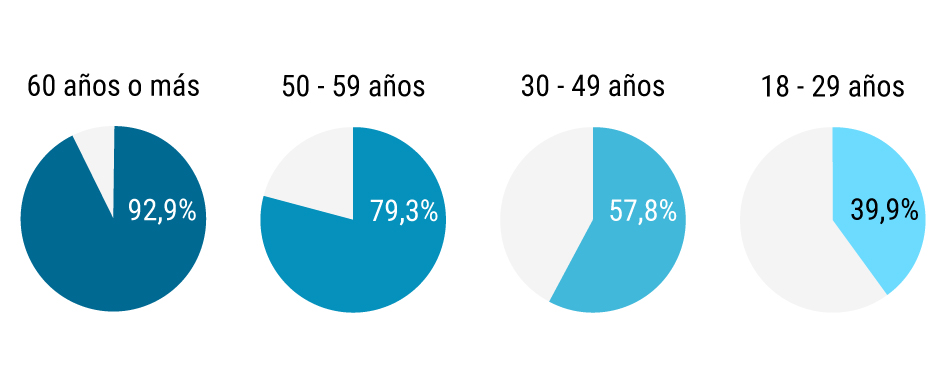Fourth dose Europe defends the clear benefits against Covid of giving the fourth dose of the vaccine to those over 60 years of age
Vaccination against Covid-19 began in Spain on December 27, 2020. Since then and until last Wednesday, August 3, 93.1% of the population over 12 years of age have at least one dose, 92. 8% with the second dose or complete regimen and 54.4% with the third dose or first booster dose, according to the Covid-19 Vaccination Executive Report published every Friday by the Ministry of Health.
The evolution of vaccination has been efficient and rapid, however, certain organizations such as the European Center for Disease Control and Prevention (ECDC) have
been recommending the implementation of a fourth dose
or second booster dose since April.
On April 28, the center published a statement in which it conveyed the importance of vaccinating with a second booster dose (fourth dose) to
avoid a substantial number of deaths
from COVID-19 from now until mid-autumn 2022. This dose is aimed at vulnerable groups, including the population over 60 years of age.
As of May 16, there were 16 European countries that already promoted the administration of the second booster dose within their territories.
Among them, some of our neighboring countries such as Portugal, France or Germany.
In July, this same organization reiterated the recommendation to administer a second booster dose as soon as possible to the different types of vulnerable population, especially in those countries where the wave of omicron BA subvariants.
4 and BA.
5 was starting or had not yet reached its peak.
At that time
, Spain was in the midst of a wave of these sub-variants
.
Germany, like Spain, began its vaccination at the end of December 2020, but unlike our country, it began vaccinating with the fourth dose in November 2021. The case of France is similar, starting vaccination in January 2021 and administering the second booster dose since February 2022.
The president of the Spanish Association of Vaccinology, Amós García Rojas, explains the reason why in Spain the administration of the second booster dose has been postponed to autumn 2022. "First of all, it is foreseeable that in September-October the vaccines that achieve adequate protection against the new omicron variants, which generates a plus for the defense of our vulnerable cases.Secondly -he explains- we also understand that
the greatest impact of the disease will be in winter
and the last vaccination it's too recent. The number of cases had already peaked and is apparently on the decline, so at that time it was more reasonable to consider intervention in the fall."
THE OLDER, THE MORE VULNERABILITY
Although in Europe at first the administration of the second booster dose was planned for people over 80 years of age and people included in group 7 at risk (cancer patients, transplant recipients, on dialysis or hemodialysis, over 40 years of age with syndrome of Down or who take immunosuppressive drugs), it was finally decided to reduce the age and start
administering the vaccine to those over 60 years of age
.
García Rojas explains that this is due "fundamentally to having observed the great impact in terms of cumulative incidence that the new subvariants derived from the omicron were having. In
the 1980s, there is an important group of people susceptible to having a risk profile when it comes to contracting severe complications from the infection. The clearest vulnerability factor that Covid has is age.
The older, the more vulnerable
."
In the first week of April, Germany (5.3) and France (6.7) registered higher mortality rates per 100,000 inhabitants of the population over 60 years of age than those of Spain (2.27).
This trend continued until June when Spain began to record
figures that were successively higher than those of these countries
.
While the Spanish continued to administer the first booster vaccine (third dose), these countries were already administering the fourth to the most fragile population.
This increase in deaths could be due to the delay in the administration of the fourth vaccine to a larger population of our country, which has been successfully vaccinated with the third dose.
The seventh wave of the pandemic carried out by the BA.4 and BA.5 omicron subvariants began at the end of March, and it was in mid-April that the ECDC published the report recommending the administration of the second booster dose (fourth dose) as soon as possible.
From April 1 to July 25, a total of 6,597 deaths from Covid-19 have been registered in people over 60 years of age, according to the latest data recorded by the Ministry of Health.
PERCENTAGE OF THE POPULATION WITH THE THIRD DOSE ADMINISTERED BY AUTONOMOUS COMMUNITY AND AGE
Despite the fact that the administration of the first booster dose is particularly advanced in our country, we still find substantial differences between autonomous communities and age groups.
For the president of the Spanish Association of Vaccinology, these contrasts are probably due to
"pandemic fatigue"
and indicates that "many young people and adults were infected during the last wave. That, together with a generally not very serious clinical picture, can lead them to refuse the vaccine. They may also have the false feeling that with the first two doses and the disease they can be protected".
The important thing, as García affirms, "is that precisely this second dose is going to be given to groups that are very attached to vaccination.
This pandemic fatigue occurs more in those under 40 years of age
, so I don't think there will be any type of rejection in people who are sensitive to receiving it."
Conforms to The Trust Project criteria
Know more
Vaccines
covid 19
Coronavirus

